Entertainment
JUST-IN: NCS Moves Bobrisky To Kirkiri Prison

The Nigerian Correctional Service (NCS) has moved the troubled transvestite, Idris Okuneye, also known as Bobrisky, from the Ikoyi Correctional Center to the Kirikiri Prison.
Bobrisky was sentenced to six months in prison for abusing the Naira.
Contrary to speculations, Bobrisky is not currently being housed at the Ikoyi Correctional Facility.
According to LEADERSHIP, the popular cross-dresser is presently held at the Kirikiri Prison and was discreetly transferred since last weekend to Kirikiri.
He stated, “It is procedural that he is moved to Kirikiri since it is an expansive prison compared to what we have here.”
He added that due to security reasons, Okuneye was quietly moved to the facility where he will serve his term.
It would be recalled that Justice Abimbola Awogboro of the Federal High Court in Lagos sentenced the cross-dresser to six months imprisonment.
While sentencing the convict on Friday, April 12, 2024, the judge said the verdict would serve as deterrent to others who are fond of abusing and mutilating the naira.
Bobrisky is being identified as a male based on his admission at the court last week and according to reports that there is no realignment of gender or genital organs.
The source affirmed that the convict has been taken to the male cell with other inmate “and so he will be treated as a normal inmate,” he said.
Entertainment
Amnesty kick against NBC ban on Eedris Abdulkareem’s song
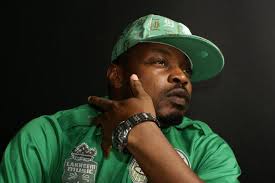
*Says, it’s unconstitutional
By Francesca Hangeior
Human rights organisation, Amnesty International, has condemned the recent decision by the National Broadcasting Commission to ban Nigerian rapper, Eedris Abdulkareem’s new protest song, Tell Your Papa, labelling the move a “clear violation” of the right to freedom of expression and access to information.
Amnesty International in a statement described the ban as “unlawful, arbitrary, and deeply worrying,” asserting that it reflected a dangerous trend of censorship and intolerance by the authorities under President Bola Ahmed Tinubu’s administration.
“The National Broadcasting Commission’s blatant ban of broadcasting Eedris Abdulkareem’s song Tell Your Papa is a clear violation of freedom of expression, which includes the right to obtain information,” the organisation said.
NBC had classified the politically charged song, which criticises the government and highlights social and economic hardship, as “Not To Be Broadcast,” citing provisions in the Nigerian Broadcasting Code.
However, Amnesty International said the move lacked any legal or moral justification.
“Categorizing the song as ‘Not To Be Broadcast’ for solely being critical of the government and people in power is an abuse of power and is unacceptable,” Amnesty said, noting that the action was “entirely inconsistent and incompatible with the right to access information and media freedom in Nigeria.”
The group further called on President Tinubu to “immediately direct the NBC to withdraw the bizarre ban which violates a range of human rights.”
Amnesty also warned that the clampdown could have far-reaching consequences for artists, media houses, and freedom of expression in Nigeria.
“The arbitrary and unlawful ban by the NBC would have a disproportionate and chilling effect on the work of radio and television stations in Nigeria.
“This clampdown on artistic freedom is an appalling reminder that artists are at the risk of being silenced. Nothing can justify suffocating creativity,” the statement read.
AI argued that the move by NBC also puts Nigeria in violation of its international and regional obligations, particularly under the International Covenant on Civil and Political Rights and the African Charter on Human and Peoples’ Rights—both of which guarantee the right to free expression and artistic freedom.
“Citing the deeply flawed and problematic Nigerian Broadcasting Code to justify the ban shows a new level of intolerance of dissenting voices,” the group stated.
The organisation reiterated its call for urgent reforms to NBC’s regulatory framework, which it says has long been used to “curb dissent and muzzle the press.”
“The ban highlighted the need to urgently repeal heavy censorship regulations of NBC that have been used to curb freedom of expression in the country,” the group said.
Amnesty concluded by warning that if the ban is not reversed, it could set a dangerous precedent for broader government censorship.
“It is not too late for President Bola Tinubu’s government to withdraw the ban which will have the sad repercussion of promoting censorship and generating a new wave of fear of repression,” the statement concluded.
As of the time of filing this report, NBC has not responded to Amnesty International’s statement, and President Tinubu has yet to make any public comment on the matter.
Entertainment
“So nobody wan tell Chief Priest that his new song no sweet”- Bugzy DVinci quizzes Nigerians

Media figure Bugzy Dvinci has raised a question to Nigerians about why no one has informed Cubana Chief Priest that his latest song is not enjoyable to listen to.
In a video shared online, Bugzy Dvinci expressed that Cubana Chief Priest’s foray into music is contributing to the decline in the quality of musicians in Nigeria.
He stated that just because Cubana has the funds to pay for studio time, it doesn’t mean he can produce good music.
“So nobody wan tell Chief Priest that his new song no sweet and that this kind things dey destroy the quality of musicians. Just because you have money, paid people, and entered the studio you think you can sing any song. Your song isn’t sweet”.
As the situation with Cubana and his supposed baby mama unfolds, Bugzy DVinci called out Hellen Ati for accusing the businessman of stealing her star for his own gain.
He argues that such beliefs are misconceptions created by some pastors.
Entertainment
Eedris Abdulkareem criticizes NBC for prohibiting his protest song “Tell Your Papa,”
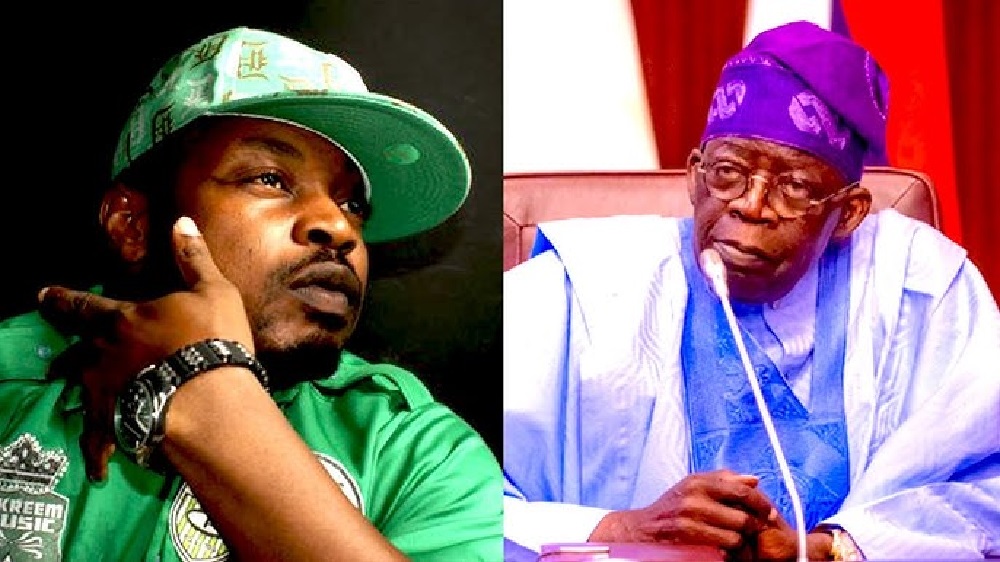
Veteran Nigerian rapper and social activist, Eedris Abdulkareem, has condemned the National Broadcasting Commission (NBC) for banning his politically charged song, “Tell Your Papa,” which criticizes the deteriorating socio-economic conditions in the country and calls out President Bola Tinubu through his son, Seyi Tinubu.
In the controversial track, which has been trending across social media platforms since its release, Eedris delivers a raw and uncompromising message, urging Seyi Tinubu to confront his father over the prevailing hardships in Nigeria. With lyrics such as “Seyi, tell your papa country hard… tell your papa people dey die” and “try travel by road without security,” the rapper paints a grim picture of insecurity, poverty, and government insensitivity.
In a memo dated April 9, 2025, the NBC officially directed all broadcast stations to refrain from airing “Tell Your Papa.” The directive was signed by the Coordinating Director of Broadcast Monitoring, Susan Obi, and referenced Section 3.1.8 of the Nigeria Broadcasting Code, which bars the broadcast of materials deemed “inappropriate, offensive, or in breach of public decency.”
According to the Commission, although the song continues to gain traction online, its lyrics fall short of the standards expected of content aired on national radio and television. The track was officially labelled “Not To Be Broadcast (NTBB),” effectively restricting its presence in traditional media.
Reacting to the ban in a statement shared via his Instagram page on Thursday, Eedris did not mince words in his criticism of the Tinubu-led administration, accusing it of intolerance to dissent and branding it as vindictive and oppressive.
“It’s obvious that in Nigeria, truth and constructive criticism is always deemed as a big crime by the government,” he wrote. “This present administration led by President Bola Ahmed Tinubu is going down in history as one of the most insensitive, vindictive, and grossly maleficent regimes this country has ever endured.”
Eedris went further, comparing the current ban to a similar incident in 2004 when former President Olusegun Obasanjo’s government banned his now-iconic protest song “Jaga Jaga.” That track, much like “Tell Your Papa,” called out the rot in Nigeria’s political and economic systems and sparked national debate.
Reflecting on his decades-long activism through music, Eedris noted that censorship has become a recurring tool used by Nigerian governments to suppress voices of dissent. “This is history repeating itself. They banned Jaga Jaga 21 years ago, and here we are again. Has anything really changed?” he asked rhetorically.
The rapper insisted that banning the song would not silence the growing frustration among ordinary Nigerians who face daily challenges ranging from hunger and insecurity to joblessness and inflation.
“This government should understand that the conscience is an open wound. Only truth can heal it,” he said. “Rather than attacking the messenger, they should focus on fixing the message—the reality we all face.”
Following the NBC’s decision, fans and civil society activists have taken to social media to show support for Eedris and condemn what they see as a continued erosion of free expression in Nigeria. The hashtag #TellYourPapa is gaining traction, with many sharing their personal experiences and frustrations under the current administration.
While traditional broadcast stations may be barred from airing the song, it continues to circulate widely online, cementing Eedris Abdulkareem’s reputation as one of Nigeria’s most vocal musical dissidents.
-

 News18 hours ago
News18 hours agoAmbassadorial list ready for NASS review after DSS clearance – FG
-

 News6 hours ago
News6 hours agoConstituents Drag Akpabio, Senate to Court Over Suspension of Natasha
-
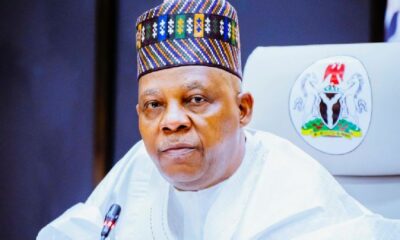
 News14 hours ago
News14 hours agoSecurity operatives halt attempt to break into VP Shettima’s residence, nab suspect
-

 News14 hours ago
News14 hours agoSuit Seeking To Sack Ibas As Administrator Suffers Heavy Setback
-
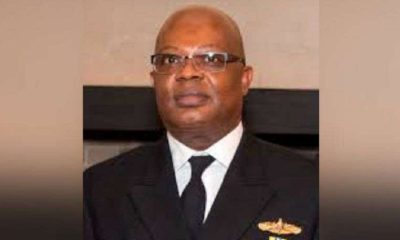
 News12 hours ago
News12 hours agoIbas pouring petrol on fire in Rivers, Briggs laments
-

 News19 hours ago
News19 hours agoPopular actress passes away + Photo
-

 News19 hours ago
News19 hours agoFG Issues Flood Warning for 30 States and FCT in 2025: Communities Urged to Prepare (Full List)
-
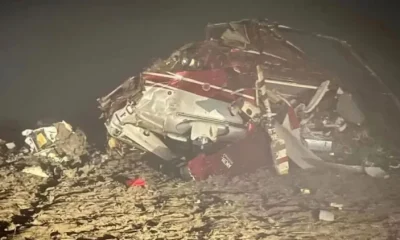
 News13 hours ago
News13 hours agoPAINFUL! Six Persons Perish In Helicopter Crash






